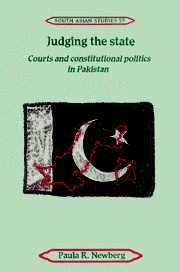Book contents
- Frontmatter
- Contents
- Preface
- Introduction
- 1 Structuring the state
- 2 Constituting the state (1947–1958)
- 3 Confining courts and constitutions (1958–1969)
- 4 Seeking justice (1969–1972)
- 5 Testing courts and constitutionalism (1972–1977)
- 6 Silencing courts, muting justice (1977–1988)
- 7 Reviving judicial powers (1988–1993)
- 8 Judging the state
- Table of cases
- Bibliography
- Index
- Cambridge South Asian Studies
Introduction
Published online by Cambridge University Press: 06 January 2010
- Frontmatter
- Contents
- Preface
- Introduction
- 1 Structuring the state
- 2 Constituting the state (1947–1958)
- 3 Confining courts and constitutions (1958–1969)
- 4 Seeking justice (1969–1972)
- 5 Testing courts and constitutionalism (1972–1977)
- 6 Silencing courts, muting justice (1977–1988)
- 7 Reviving judicial powers (1988–1993)
- 8 Judging the state
- Table of cases
- Bibliography
- Index
- Cambridge South Asian Studies
Summary
In Georg Buechner's drama recreating the conflicts of Jacobin France, a deputy of the National Convention describes a constitution as “a transparent garment clinging to the body politic.” His comment encapsulates the dialectic that is always present in constructing a constitution, for constitutions reflect at once the imperfections and the aspirations of a political community. Tensions between the ideal and the real – making a political community out of diverse parts, creating something new while retaining the identities of the old – highlight the obstacles and opportunities that states and citizens encounter as they configure their political means and ends. Similar problems confront old states and new, those seeking to redefine their ideological foundations within accustomed territorial borders, and those establishing legal entities in equally new physical circumstances.
The process of constituting a new state – literally, writing its constitution – involves both political and juridical tasks. In the first instance, writing a constitution provides a legal frame for the state, a method of organizing authority and adjudicating conflicts about power. It also speaks to the political pasts and futures of those who comprise it – establishing the sources, character and conditions of collective identity and sovereignty. These activities are mutually reinforcing: citizenship must be meaningful to individuals in political society and effective in the state structure.
- Type
- Chapter
- Information
- Judging the StateCourts and Constitutional Politics in Pakistan, pp. 1 - 8Publisher: Cambridge University PressPrint publication year: 1995

